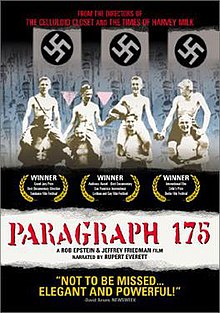나치 형법 175조
이 기사에는 적절한 소개 부분이나 요약이 없거나 부족합니다 . |
| 나치 형법 175조 | |
|---|---|
| Paragraph 175 | |
| 감독 | 롭 엡스타인 제프리 프리드먼 |
| 각본 | 샤론 우드 |
| 제작 | 자넷 콜 마이클 엘렌스 바이그 |
| 출연자 | 루퍼트 에버렛 |
| 음악 | 티볼 세메주 |
| 촬영 | 번드 마이너스 |
| 편집 | 도운 로그스동 |
| 제작회사 | 텔링 픽처스 |
| 배급 | |
| 공개 | ( 선댄스 영화제 ) |
| 상영시간 | 81분 |
| 제작국 | |
| 언어 | 영어 / 독일어 / 프랑스어 |
『나치 형법 175조』( 영 : Paragraph 175 )는 1999년 에 제작된 미국 의 다큐멘터리 영화 . 일본에서는 ' 형법 175 조'로 영화제에서 상영된 뒤 2024년 3월 23일 '나치 형법 175조'로 극장 공개됐다.
캐스트 [ 편집 ]
- 루퍼트 에버렛 (나레이션)
상영 [ 편집 ]
- 2001년 야마가타 국제 다큐멘터리 영화제 (10월) [1]
- 2009년 제2회 암네스티 영화제 (1월 17일·18일) [2]
- 2010년 제5회 아오모리 인터내셔널 LGBT 필름 페스티벌 (7월 3일) [3]
관련 항목 [ 편집 ]
각주 [ 편집 ]
- ↑ YIDFF: 간행물: YIDFF 2001 공식 카탈로그
- ↑ 공식 사이트 (2011년 3월 11일 시점의 아카이브 )
- ↑ 상영 프로그램 | 아오모리 인터내셔널 LGBT 필름 페스티벌 2010
외부 링크 [ 편집 ]
- 나치 형법 175조 - allcinema
- 나치 형법 175조 - KINENOTE
- Paragraph 175 - 올 영화 (영어)
- Paragraph 175 - IMDb (영어)
Paragraph 175 (film)
| Paragraph 175 | |
|---|---|
| Directed by | Rob Epstein Jeffrey Friedman |
| Written by | Sharon Wood |
| Produced by | Rob Epstein Jeffrey Friedman Michael Ehrenzweig Janet Cole |
| Starring | Rupert Everett Gad Beck Heinz Dormer |
| Narrated by | Rupert Everett |
| Cinematography | Bernd Meiners |
| Edited by | Dawn Logsdon |
| Music by | Tibor Szemző |
Production company | |
| Distributed by | New Yorker Films |
Release date |
|
Running time | 81 minutes |
| Countries | United Kingdom Germany United States |
| Languages | French English German |


Paragraph 175 is a 2000 documentary film, directed by Rob Epstein and Jeffrey Friedman,[1] and narrated by Rupert Everett.[2] The film was produced by Rob Epstein, Jeffrey Friedman, Janet Cole, Michael Ehrenzweig, Sheila Nevins and Howard Rosenman.
Summary[edit]
The film chronicles the lives of several gay men and one lesbian who were persecuted by the Nazis. The gay men were arrested by the Nazis for the crime of homosexuality under Paragraph 175, the sodomy provision of the German penal code, dating back to 1871. Between 1933 and 1945, 100,000 men were arrested under Paragraph 175. Some were imprisoned, others were sent to concentration camps. Only about 4,000 survived.
In 2000, fewer than ten of these men were known to be living. Five come forward in the documentary to tell their stories for the first time, considered to be among the last untold stories of the Third Reich.
Paragraph 175 tells of a gap in the historical record and reveals the lasting consequences, as told through personal stories of gay men and women who lived through it, including: Karl Gorath; Gad Beck, the Jewish resistance fighter who spent the war helping refugees escape Berlin; Annette Eick, a Jewish lesbian who escaped to England with the help of a woman she loved; Albrecht Becker, German Christian photographer, who was arrested and imprisoned for homosexuality, then joined the army on his release because he "wanted to be with men"; and Pierre Seel, the Alsatian teenager, who watched as his lover was eaten alive by dogs in the camps.
Awards[edit]
- Teddy Award for best documentary film, 2000[3]
See also[edit]
References[edit]
External links[edit]
- Paragraph 175 at IMDb
- Paragraph 175 at AllMovie
- Paragraph 175 at the TCM Movie Database
- Paragraph 175 at the American Film Institute Catalog
- NPR, All Things Considered - Rob Epstein remembers Pierre Seel - 2 December 2005 (audio file)
No comments:
Post a Comment